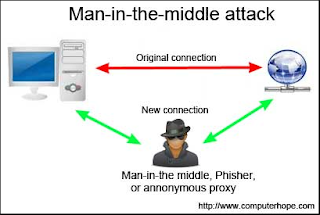 |
| Image credit |
Generally society does not understand the risks in using the Internet from a public place (hotels, airports, bookstores, coffee shops, etc.). The Internet is full of free tools that allow any person (or hacker) to secretly capture data (or live session data) while you're connected to an unprotected public WiFi. One way to capture data is using a Man-in-the-middle attack. Hackers configure equipment (such as the WiFi pineapple) between you and the Internet connection point to covertly copy of all the data you're transmitting.
The end user has no way of knowing that every keystrokes is being captured. The hacker may immediately sent to other parties who scour the data usernames, credit card numbers and other information sent in plain text.
Individuals who access the Internet using a public WiFI (without the benefit of a VPN connection) face many risks. A hacker can set up a fake network with a legitimate name to capture data from unsuspecting users who connect to it. It's never safe to assume that the network you're connecting to is legitimate. The WiFi Pineapple is designed to capture data from an unsuspecting victim. There are numerous youtube videos that document how to do this in 10 minutes or less: https://www.youtube.com/watch?v=x0ma1vyHcyg
It makes sense to protect yourself and your data. Running a VPN to protect your data makes sense anytime you're connected to a public WiFi network. If you work for a company, establish the corporate VPN solution managed by your organization. The VPN allows you to securely access the corporate network AND it prevents hackers from intercepting the data you transmit over the Internet. The VPN protects data moving across a public network by encrypting the data. Encryption is a process that converts readable data into gobbledygook, or something that is unreadable. Once the data is back to a trusted server the data is decrypted back into a readable form.
Many individuals are also using VPN software to protect their privacy and data. PC News provides a number of solutions in their June 13, 2016 article, The Best VPN Services of 2016 at http://www.pcmag.com/article2/0,2817,2403388,00.asp
Looking for more information about the risk in using public WiFi? Look no further than an article written by SavvyMedia Gal27 "Why Hackers Love Public WiFi" at https://community.norton.com/en/blogs/norton-protection-blog/why-hackers-love-public-wifi
If you value your privacy and want to protect your data, get and use a VPN.
